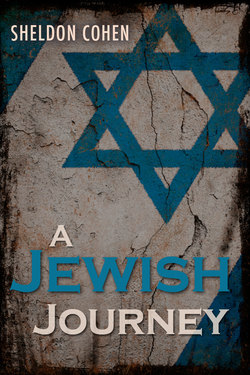Читать книгу A Jewish Journey - Sheldon Cohen - Страница 28
На сайте Литреса книга снята с продажи.
CHAPTER 10 By 1870, Shepsel had reached the age of 77 years. When his wife preceded him in death, he retired from the rabbinate and went to live with his son Jacob.
Оглавление“Jacob,” he said, “I brought with me my most precious possession.” He opened a leather suitcase and removed the Torah that passed down from his father.
“Your great-great grandfather wrote this Torah with his own hand many years ago. He gave it to his son who gave it to his son, my father, Meir. He passed it on to me before he died. I entrust it to you, my son. I know I place it in dedicated hands. You will guard it and treasure it as we all have before you. It is a symbol of our families fight to keep Judaism alive for future generations. Your great-great grandfather’s signature is at the end of the scroll as is the signature of all of us who will possess this precious heirloom.”
Jacob took the Torah from his father hands, smiled, stared at it in silence and cradled it in his arms.
In 1874, a general military draft required Jews to sign up for four years. Deferments were available for those Jews who went to Russian language schools, so there was an inflow of Jews toward the Russian schools.
The reforms of Alexander II had the effect of allowing the Jews to think that the Russian government was indeed fostering assimilation of the Jewish community into the Russian mainstream. In addition, the Jewish population was rising because of a very high birthrate and lowered death rate. Jews became an important part of the cultural and intellectual life of Russia. They made an impact upon the arts, literature, journalism, the theater, law, and medicine. It became clear over time that their influence far exceeded their numbers. However, the great majority of Jews remained poor and oppressed.
Russian society took note of the appearance of Jews in the upper echelons and reacted with bitter accusations. Since some of the most prominent Russian intellectuals were involved in this “expose,” their input, coupled with an increasing suspicion of the Jews amongst the masses, served to unify Russian thinking about the Jews. Some said they were “creating a state within a state,” and their enemies went so far as to accuse Jews of killing gentile boys in order to get their blood for use in the preparation of matzo for the Passover celebration. Jacob became a representative for one Jewish man so accused. He pointed out that Jewish law forbids the eating of blood, and that after the koshering process, there is no blood left in the meat. Jacob’s efforts were successful. Even the Russian government came to the Jew’s defense.
This single defeat did not stop those responsible for the propaganda against the Jews, and they altered course, playing up the theme that these Jewish ‘aliens’ true purpose was to gain control of the economic, cultural and political life of the nation.
Concurrent with these forces, Slav nationalists were at war with the Ottoman Empire, and Alexander II came to the aid of the Slavs by declaring war on Turkey. After initial setbacks, the Russians triumphed, but the peace treaty did not go well for the Russians, so the Czar came under increasing pressure from reactionary elements and found himself the victim of several unsuccessful assassination attempts. In 1881, however, they finally succeeded. This threw the country into chaos.
Rabbi Shepsel and his son Jacob learned of the Czar’s death, and fear overcame them both. As best as they could ascertain, the plight of the Jews was improving because of the Czar’s reforms, but now what would happen? Would these reforms be overturned?
Shepsel was now 88 years old, still alert but weary. Fearing for his family’s safety, Jacob sent a letter to his sister in Moscow advising her that his wife and son, Moritz, and his father would be coming there for a visit. Shepsel refused, so he and Jacob remained in Yelizavetgrad.
It was not long before the word rang out that “The Jews assassinated the Czar.” The Russian government promoted this belief to divert attention from the fact that the government had declared a state of emergency to counter the revolutionaries who were now calling upon the people to take up arms and overthrow the government. This declaration gave the government the power to detain any suspicious suspects without trial, search homes or offices without warrants, dismiss any suspicious administrative official on the spot and close any newspaper or magazine or periodical at will.
It wasn’t long before anti-Semitism was converted into a fully respected political dogma. The word rang out that the Jews were out to control the world.
The peasants were furious. In 1881, pogroms started throughout the Pale. Jewish homes and businesses were ransacked and looted. The local police would often announce they were leaving town for a few days, thus allowing the pogroms to go unheeded by the authorities. At times, a pogrom would occur in sight of authorities, but they would stand by and do nothing unless there was Jewish resistance. Then they would intervene against the Jews, killing some, injuring more.
Shepsel, his mind and body failing, took to his bed. Jacob remained at his father’s side, speaking with him until he became too weak to speak. Rabbi Shepsel stopped eating, and then holding his son’s hand he lapsed into coma and died within two days. Jacob had him buried next to his beloved wife, Anna, in Tiktin.
